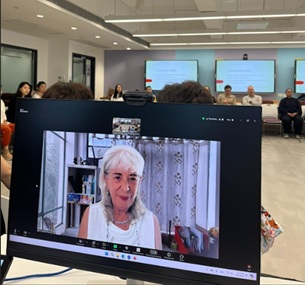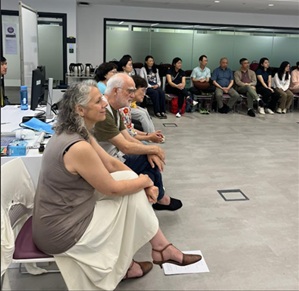I was waiting for Stephen Batchelor at the entrance to the Chinese University of Hong Kong when a sudden downpour of tropical rain began. Sheltered beneath the concrete roof of the railway station, I found myself enjoying the rainfall, hoping it would bring some relief from the pressing humidity typical of a Hong Kong summer. Not carrying an umbrella myself, I was grateful when Tiffany—a member of the International Conference of Mindfulness – Asia-Pacific Mindfulness (ICMAP) 2025 organizing committee—offered to share hers as we began the short uphill walk to the building where Stephen and I would be leading a daylong workshop on Mindfulness-Based Ethical Living (MBEL).
Soaked to the bone after the short walk, I began chatting with the student volunteers who were supporting us with their technological know-how throughout the day. Originally, Stephen and I were to be joined by Carmel Shalev in facilitating the workshop. However, due to the outbreak of the Israel-Iran war and the resulting closure of airspace, Carmel was unable to travel from her home in Tel Aviv. With the students' help, we arranged for her to join us virtually in the afternoon, after our lunch break.

Stephen had been invited to deliver a keynote talk at ICMAP 2025 at the Chinese University of Hong Kong, followed by a post-conference daylong workshop on ethical mindfulness. He had asked our MBEL team if anyone would be willing to accompany him, and both Carmel and I were happy to accept.
The Key Idea of the MBEL Course
By that time, our international MBEL team had been meeting online for nearly three years, ever since Stephen’s four-week online course Mindfulness-Based Human Flourishing in October 2022. Encouraged by him to develop an MBSR-like program grounded in his interpretation—and reshaping—of the Four Noble Truths into Four Tasks, we had gradually co-created what would become MBEL: a 10-week online course with weekly meetings, set to launch with a pilot in September 2025. The Four Tasks, as Stephen reframes them, invite us to embrace life in its full complexity—not just suffering but all of our experiences—with understanding, to let go of reactivity, to cultivate wholesome ways of being, and to act with care in the world.
In our MBEL course, we expand the notion of mindfulness to include an ethical component. The term mindfulness has become ubiquitous and has many current uses and interpretations. The most often quoted definition of mindfulness was coined by Jon Kabat-Zinn: “Mindfulness is paying attention, on purpose, in the present moment and non-judgmentally to things as they are.”
While this notion of mindfulness as present-moment awareness is valuable, we need to make a distinction between awareness with an ethical element and awareness without the ethical component. We can be very much aware of harming someone, but this is not being mindful if it lacks the ethical dimension of benevolence.
With this broader notion of mindfulness, we recognize that meditation might be practiced not solely for our own individual self-development, help or benefit, but for the well-being of all. We suggest that mindfulness not be restricted to a formal meditation practice on the cushion but extend to bringing caring attention into every aspect of our lives, from moment to moment.
Thus, from the perspective of MBEL, mindfulness is the practice of present-moment awareness with a commitment to cultivate skillful states of mind that facilitate a kind and caring relationship with the world.
To learn more about the MBEL pilot course, click here.
Śāntideva on Mindfulness, Non-reactivity, and Ethical living
After a brief icebreaker, we invited the 50 workshop participants to reflect on the question: What is care (for you)? They explored the question in pairs before sharing their insights with the wider group.
Stephen then introduced his Cartography of Care—a detailed map of the terrain around the Four Tasks and other early Buddhist teachings. The connective tissue throughout Stephen’s presentation (and within the Cartography of Care) was mindfulness—or as I prefer to say, present-moment awareness.

Stephen referred to two verses from Śāntideva’s Way of the Bodhisattva that he had quoted during his keynote, to illustrate the vital connection between mindfulness, non-reactivity, and ethical living:
If the roaming elephant of my mind is bound
On all sides by the rope of mindfulness,
All fears will cease to exist
And all virtues will come into my hand.
Śāntideva. A Guide to the Bodhisattva's Way of Life Bodhicaryāvatāra 5:3, translated by Stephen Batchelor
In this verse, Śāntideva not only describes how present-moment awareness must be practiced consistently to tame the “roaming elephant” of the mind—often called the “monkey mind” today—but also asserts that once this is achieved, we may no longer be dominated by fear and anxiety, often stemming from the drive to maintain and protect our ego. In the absence of fear—thanks to the steady tether of present-moment awareness—we are more naturally able to live a virtuous life. From our own experience we might notice that mindfulness helps us relate to fear differently, loosening its grip and allowing us to respond with greater freedom. From my own work with clients, family, and friends—as well as personal experience—this deeply resonates.
Later in The Way of the Bodhisattva, Śāntideva offers guidance on what to do when we notice our reactivity—or, in his words, when the elephant of our mind is roaming:
When, just as I am about to act,
I see that my mind is compromised,
At such time I should remain
Unmovable, like a piece of wood.
Śāntideva. A Guide to the Bodhisattva's Way of Life Bodhicaryāvatāra 5:34, translated by Stephen Batchelor
Ethical Mindfulness in the Contemporary World
Here we’re reminded of the importance of pausing—of recognizing when our mind is compromised, and remaining “unmovable, like a piece of wood” before responding. In today’s language, it’s the inner capacity to “find the brake” instead of pressing the gas pedal. To stop, pause, and remember our intentions in light of our deeper, consciously chosen values. In moments of reactivity—like when anger flares—it’s tempting to act on surface impulses or ingrained habits. But stepping back offers a chance to reconnect with the values that truly guide us, allowing us to respond thoughtfully, ethically, and with integrity.
The atmosphere in the room was engaged and energetic when participants later broke into small groups for further reflection. Many were not only mindfulness practitioners but also mindfulness teachers and researchers. We sensed that their cultural upbringing and embeddedness in Asian traditions created fertile ground for the MBEL approach.
After lunch, Carmel joined us virtually. She appeared on large screens around the room and could both see and hear the group clearly. She shared her personal experience of being cut off from the conference, describing how this disruption had become an invitation to practice the very heart of MBEL: recognizing reactivity, allowing it to be, watching it pass, and finding acceptance for what lies beyond our control. Her presence—even across great distance—touched us all and underscored the ongoing, embodied nature of this path.

Later in the afternoon, our reflections turned to how we might cultivate our capacity for mindfulness in the midst of daily life, so that we respond to circumstances rather than react automatically out of habit.
The insights from Śāntideva naturally resonated with a more contemporary articulation of the same principle, often attributed to Viktor Frankl but actually a paraphrase popularized by Stephen Covey in The 7 Habits of Highly Effective People:
Between stimulus and response there is a space. In that space is our power to choose our response. In our response lies our growth and our freedom.
We explored this idea further—how allowing for that space, and choosing our response rather than reacting out of habitual patterns, is intimately connected to responsibility: our ability to respond with care and consideration for others and the world around us. Mindfulness practices can help us cultivate this pause, empowering us to embody ethical responsiveness in everyday life.
We also returned to Frankl’s own words in Man’s Search for Meaning:
Everything can be taken from a man but one thing: the last of the human freedoms—to choose one’s attitude in any given set of circumstances, to choose one’s own way.
Frankl wrote this soon after surviving Auschwitz, where he observed that those who managed to hold on to a sense of meaning—and sometimes extend care to others despite their own suffering—were often those who endured the camps.

For Frankl, it was this capacity to find meaning, even amidst unimaginable suffering, that sustained the will to live. This freedom to choose—what he called the last of the human freedoms—is not just about personal agency. It is intricately bound with care: care for oneself and care for others are deeply interconnected.
In MBEL, this space between stimulus and response is not an abstract idea but a lived practice, a cultivated skill. It is in this space that mindfulness becomes ethical, presence becomes care, and our responses can align with our deepest values.
We emphasized that ethical living, as we understand it in MBEL, is not about following fixed rules or adhering to external codes. Ethics is always situational—it unfolds within context, moment by moment. It calls for sensitivity, discernment, and presence. What is “right” in one situation may not be in another. This is why mindfulness—present-moment awareness—is essential: it helps us perceive clearly what is needed here, now, with this person, in this particular situation. Ethical responsiveness is not a technique we apply—it is a way of being we embody.
Our afternoon reflections included not only moments of insight but also honest acknowledgments of the difficulties involved in dwelling in non-reactivity—especially when strong emotions arise or situations become complex. Participants engaged with the richness and subtlety of the conversations, discovering that there are no simple answers, only a terrain to be explored with curiosity, discernment, and kindness.
Our impression was that participants found the workshop enlightening, engaging, and supportive. One of the student volunteers who had supported us with technical know-how throughout the day shared afterwards how much they enjoyed the workshop and how much they had learned. Many expressed interest in continuing to explore MBEL and ethical mindfulness in their own contexts. The energy in the room felt warm, open, and full of potential.
An Invitation to Participate in MBEL
As we move toward launching the first MBEL online course in September 2025, we’re excited to continue developing and sharing this work. Ethical Mindfulness is envisioned as a broad, inclusive umbrella under which MBEL will be one of several offerings—all grounded in mindfulness, ethical inquiry, and human flourishing.
We warmly invite mindfulness practitioners, teachers, and curious explorers from around the world to join us. To stay informed about upcoming courses, resources, and community gatherings, please visit ethicalmindfulness.org. We hope this evolving community will become a shared space of mindful reflection, care, and wise engagement with the world.
As I made my way back to the train station that evening, my shoes and feet were still wet—just as they had been throughout the day. The steady presence of that sensation accompanied me moment by moment, a quiet thread beneath the richness of dialogue and reflection. Like one of the ropes that gently bind the roaming elephant of the mind, it helped tether awareness to the present. And it served as a reminder that we don’t need pain or drama to return to ourselves—subtle sensations in the feet, or anywhere in the body, are always available, inviting us back to the ground of experience, to the simplicity of being here, now.
About the author
Ayda Duroux is a medical doctor, mindfulness teacher (MSt in MBCT, Oxon), and a co-developer of the Mindfulness-Based Ethical Living (MBEL) program.












